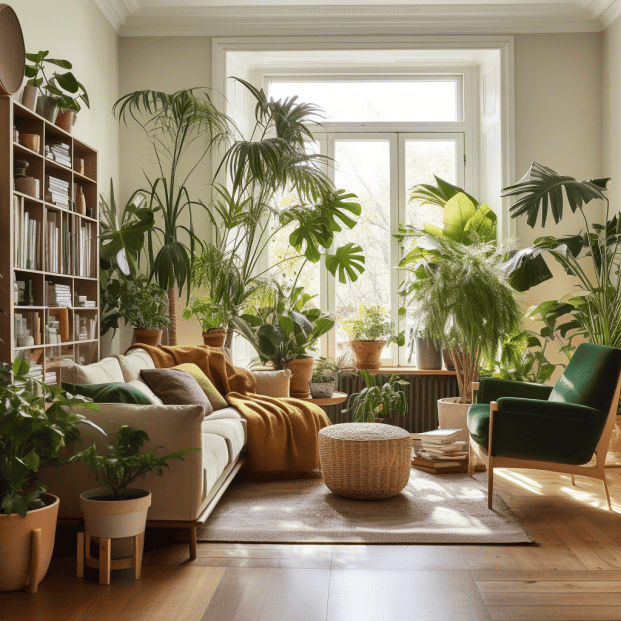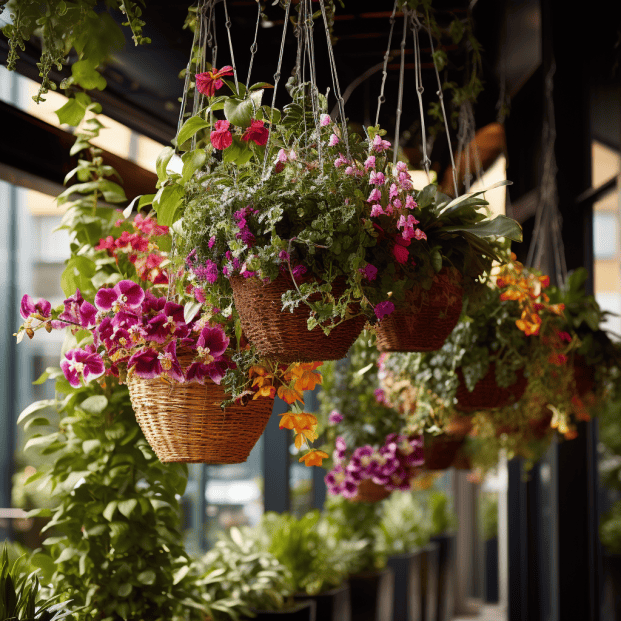Houseplants have been a popular home decor item for decades, but recent studies have shown they offer more than just aesthetic appeal. Growing and caring for houseplants can have a positive effect on mental health and stress reduction.
Research has found that spending time around plants, whether indoors or outdoors, can have a calming effect on the mind and body. One study of over 4,200 people found that caring for houseplants during COVID-19 lockdowns brought emotional benefits to 74% of participants. Nurturing and tending to a plant can provide a sense of purpose and accomplishment, leading to reduced stress levels and improved overall well-being.
In addition to the psychological benefits, plants can improve air quality and reduce noise levels in the home. This holistic approach to stress reduction offers a natural and inexpensive alternative to traditional methods, such as medication or therapy. With the growing interest in mental health and self-care, incorporating houseplants into daily routines may be a simple yet effective way to promote relaxation and reduce stress.
The Connection Between Houseplants and Mental Health
Houseplants have been found to positively affect mental health and emotional wellbeing. Research has shown that indoor plants can reduce stress, anxiety, and negative emotions, while improving mood and psychological health.
One study found that interaction with indoor plants can reduce psychological and physiological stress by suppressing autonomic nervous system activity in young adults [1]. Another study of more than 4,200 people found that houseplants brought emotional benefits to 74% of participants during COVID-19 lockdowns [2].
Caring for plants can give individuals a sense of purpose and help them feel less stressed. In addition, spending time in nature has been shown to improve mental fatigue and stress response [3]. By bringing nature indoors, houseplants can provide similar benefits to people who cannot spend time outdoors.

Moreover, houseplants can improve air quality and positively impact mental health. Poor air quality has been linked to depression symptoms and other psychological issues [4]. By purifying the air, houseplants can help create a healthier environment for individuals to live and work in.
In summary, houseplants have been found to have a positive impact on mental health and emotional wellbeing. By reducing stress, anxiety, and negative emotions, while improving mood and psychological health, indoor plants can provide a holistic approach to mental health and wellness.
Effects of Houseplants on Physical Health
Houseplants have been shown to have a positive impact on physical health. According to a systematic review with meta-analyses, indoor plants can improve individuals’ physiological functions by reducing blood pressure and heart rate. The study found that indoor plants can also improve heart rate variability, which is an indicator of cardiovascular health.
Another study found that interaction with indoor plants can reduce psychological and physiological stress by suppressing autonomic nervous system activity in young adults. This suggests that indoor plants could be used as a complementary therapy for stress reduction.
In addition to their stress-reducing effects, houseplants can also encourage exercise. Having plants around can motivate people to move around more, whether it’s watering them, pruning them, or simply admiring them. This increased physical activity can have a positive impact on overall health and well-being.

It is worth noting that some people may be allergic to certain types of houseplants. However, this is not a common issue and can usually be avoided by choosing plants that are not known to cause allergies.
Overall, the evidence suggests that houseplants can have a positive impact on physical health by reducing blood pressure and heart rate, improving heart rate variability, reducing stress, and encouraging physical activity.
Influence of Houseplants on Cognitive Function
In addition to reducing stress and improving air quality, houseplants may also have a positive impact on cognitive function. Studies have shown that exposure to plants can improve concentration, working memory, and overall cognitive functioning.
One theory behind this effect is the Attention Restoration Theory (ART), which suggests that exposure to natural environments can help restore cognitive function by providing a break from the constant stimulation of modern life. This theory is supported by research showing that exposure to natural environments, including indoor plants, can improve cognitive performance.
One study found that participants who completed a task in a room with plants performed better than those who completed the same task in a room without plants. The presence of plants was also found to improve reaction time and performance on attentional tasks.
Another study found that exposure to indoor plants can improve working memory and cognitive flexibility, two important aspects of cognitive functioning. Participants who were exposed to plants during a task performed better than those who were not exposed to plants.

Overall, the research suggests that incorporating houseplants into indoor environments can have a positive impact on cognitive function. While more research is needed to fully understand the mechanisms behind this effect, the evidence supports the idea that exposure to plants can improve concentration, working memory, and overall cognitive functioning.
Role of Houseplants in Stress Management
Houseplants have been shown to have a positive impact on stress management. Studies have found that caring for plants can give individuals a sense of purpose and help them feel less stressed. In fact, a study of over 4,200 people found that houseplants brought emotional benefits to 74% of participants during COVID-19 lockdowns [1].
Interaction with indoor foliage plants has also been found to reduce psychological and physiological responses to stress. One study found that indoor plants have positive physiological effects on the autonomic nervous system by suppressing sympathetic activity, which often increases when a person is under stress [3].
Houseplants have also been found to improve air quality, which can have a positive impact on overall health and wellbeing. This is important because environmental stressors, such as poor air quality, can contribute to stress and anxiety [4].
Incorporating houseplants into mindfulness practices, such as meditation and yoga, can also enhance the stress-reducing benefits. Mindfulness training has been found to reduce stress and increase emotional regulation [2]. Adding houseplants to these practices can create a calming and peaceful environment, further enhancing the benefits of mindfulness.
Overall, houseplants can play a valuable role in stress management. They can provide a sense of purpose, reduce physiological and psychological responses to stress, improve air quality, and enhance mindfulness practices. Incorporating houseplants into daily life can be a simple and effective way to promote overall health and wellbeing.
[1] https://www.verywellmind.com/mental-health-benefits-of-houseplants-5097479 [2] https://www.ncbi.nlm.nih.gov/pmc/articles/PMC9224521/ [3] https://www.ncbi.nlm.nih.gov/pmc/articles/PMC4419447/ [4] https://www.weforum.org/agenda/2022/08/houseplants-nature-mental-health-greenery-cognition/
Houseplants and Indoor Air Quality
Houseplants not only add a touch of nature and beauty to your home but also provide numerous benefits, such as improving indoor air quality. According to a study conducted by the University of Birmingham, ordinary potted houseplants can remove harmful pollutants from the air, including benzene, formaldehyde, and nitrogen dioxide (NO2) [1].
Foliage plants such as English Ivy, Snake Plant, and Sansevieria Trifasciata are known for their ability to remove toxins from the air. English Ivy has been found to effectively remove formaldehyde from the air [2]. Snake Plant is known for its ability to remove benzene, formaldehyde, trichloroethylene, and xylene [3].
In addition to removing harmful pollutants from the air, houseplants also increase humidity levels, which can help alleviate respiratory problems and dry skin. They also release oxygen into the air, which can help improve overall health and well-being.
Overall, incorporating houseplants into your home can provide a holistic approach to improving indoor air quality and promoting a healthy living environment.
[1] University of Birmingham. (2022, March 7). Common houseplants can improve air quality indoors. ScienceDaily. Retrieved September 17, 2023, from https://www.sciencedaily.com/releases/2022/03/220307113115.htm
[2] Wolverton, B. C., & Wolverton, J. D. (1993). Plants and Soil Microorganisms: Removal of Formaldehyde, Xylene, and Ammonia from the Indoor Environment. Journal of the Mississippi Academy of Sciences, 38(2), 11-15. Retrieved from https://www.jstor.org/stable/24399421
[3] Wolverton, B. C., Johnson, A., & Bounds, K. (1989). Interior Landscape Plants for Indoor Air Pollution Abatement. Retrieved from https://ntrs.nasa.gov/api/citations/19930073077/downloads/19930073077.pdf


Houseplants and the Pandemic
The COVID-19 pandemic has brought unprecedented challenges and stress to people’s lives. With the lockdowns, quarantines, and confinement measures in place, people have been forced to spend more time indoors, which has led to increased stress levels. In this context, houseplants have emerged as a viable solution for people looking to reduce their stress levels.
Studies have shown that caring for houseplants can have a positive impact on mental health. A study of more than 4,200 people found that houseplants brought emotional benefits to 74% of participants during COVID-19 lockdowns. Caring for plants can give people a sense of purpose and help them feel less stressed. Artificial plants, spending time outdoors, and even looking at photos of nature can offer similar benefits to people.
Houseplants can also help purify the air in indoor spaces, which can improve overall health. Plants absorb carbon dioxide and release oxygen, which can improve air quality and reduce the risk of respiratory problems. Additionally, plants can reduce levels of volatile organic compounds (VOCs) in the air, which can improve indoor air quality.
During the pandemic, people have also been spending more time working from home. Houseplants can help create a more productive and relaxing work environment. Studies have shown that plants can improve concentration and productivity, reduce stress, and boost mood and creativity.
In conclusion, houseplants can be an effective tool for reducing stress and improving mental health during the pandemic. They can also improve indoor air quality and create a more productive work environment. By incorporating houseplants into their homes and workspaces, people can take a holistic approach to reducing stress and improving overall well-being.
Therapeutic Benefits of Houseplants
Houseplants are not just a beautiful addition to your home decor, but they also offer numerous therapeutic benefits. These benefits have been recognized by experts in the field of horticultural therapy, who use plants to promote healing and well-being.
One of the most significant benefits of houseplants is their ability to reduce stress. Studies have shown that simply being around plants can have a calming effect on the mind and body. Plants can help to create a peaceful and tranquil environment, which can reduce anxiety and promote relaxation.
In addition to their calming effect, houseplants can also improve air quality. Plants absorb carbon dioxide and release oxygen, which can help to purify the air in your home. This can be especially beneficial for those who suffer from respiratory issues or allergies.
Another therapeutic benefit of houseplants is their scent. Many plants have a pleasant fragrance that can help to create a calming and relaxing atmosphere. For example, lavender is known for its soothing scent, which can help to reduce stress and promote restful sleep.

Houseplants can also be used in horticultural therapy, which is a form of therapy that uses plants and gardening to promote healing and well-being. This therapy can be especially beneficial for those who suffer from mental health issues such as depression or anxiety.
Overall, houseplants offer numerous therapeutic benefits that can promote healing and well-being. Whether you are looking to reduce stress, improve air quality, or simply create a peaceful environment, adding a few plants to your home can make a big difference.
Houseplants and the Natural Environment
Houseplants are a great way to bring a touch of nature into the home. They provide a sense of calm and relaxation, which can be particularly beneficial for those dealing with stress. Research has shown that spending time in natural environments, such as gardens, forests, and green spaces, can have a positive impact on mental health and well-being.

In addition to the mental health benefits, houseplants can also contribute to the natural environment. They can help to improve air quality by removing harmful pollutants, such as formaldehyde, benzene, and trichloroethylene, from the air. This can be particularly important for those living in urban areas, where air pollution can be a major problem.
Houseplants can also help to promote biodiversity. By providing a habitat for insects, such as bees and butterflies, they can help to support local ecosystems. This can be particularly important in areas where natural habitats have been destroyed or disrupted.


For those interested in gardening, houseplants can be a great way to get started. They are easy to care for and can be grown in a variety of environments, from small apartments to large homes. They can also be a great way to experiment with different types of plants and gardening techniques.
Overall, houseplants are a great way to bring a touch of nature into the home while also providing a range of benefits for mental health, air quality, and biodiversity. Whether you are looking to reduce stress, improve air quality, or simply add a touch of green to your home, houseplants are a great option.
Role of Color and Variety in Houseplants
Houseplants come in a variety of colors and shapes, making them an excellent way to add visual interest to any space. But did you know that the color and variety of your houseplants can also have an impact on your stress levels?
Research has shown that certain colors can have a calming effect on the mind and body. For example, green is often associated with nature and can help create a sense of calm and relaxation. White, on the other hand, can create a sense of purity and cleanliness, which can also be calming.
When it comes to flowering plants, the color of the blooms can also have an impact on stress levels. Red is often associated with passion and excitement, while blue is associated with calmness and relaxation. So, if you’re looking for a plant to help you de-stress, you may want to consider a blue or purple flowering plant.


In addition to color, the variety of your houseplants can also play a role in stress reduction. Studies have shown that simply being around plants can help reduce stress levels, but having a variety of plants can be even more beneficial. This is because different plants have different scents, textures, and shapes, which can help create a more calming and relaxing environment.
Overall, when choosing houseplants for stress reduction, it’s important to consider both the color and variety of the plants. By selecting plants with calming colors and a variety of shapes and textures, you can create a more relaxing and stress-free environment in your home or office.
Limitations and Considerations in Houseplant Therapy
While houseplant therapy has shown promising results in reducing stress and improving mental health, there are some limitations and considerations to keep in mind.
Sample Size
One limitation of many studies examining the effects of houseplants on stress reduction is the small sample size. Many studies have only included a few dozen participants, which can limit the generalizability of the results. Larger studies with more diverse populations are needed to better understand the effects of houseplants on stress reduction.
Individual Differences
It is important to note that not everyone may experience the same benefits from houseplant therapy. Individual differences such as personal preferences, living conditions, and allergies may impact the effectiveness of houseplant therapy. For example, someone who is allergic to certain plants may not experience the same stress-reducing benefits as someone who is not allergic.
Maintenance
Another consideration in houseplant therapy is the maintenance required to keep the plants healthy and thriving. While caring for plants can be a relaxing and meditative activity, it can also be time-consuming and stressful for some individuals. It is important to choose plants that are easy to care for and fit within an individual’s lifestyle and schedule.

Other Factors
It is also important to consider other factors that may impact stress levels, such as diet, exercise, and social support. While houseplant therapy can be a useful tool in reducing stress, it should not be relied upon as the sole method of stress reduction. A holistic approach that includes a variety of stress-reducing techniques is recommended for optimal mental health.
In summary, while houseplant therapy has shown promise in reducing stress and improving mental health, it is important to consider the limitations and individual differences that may impact its effectiveness. A holistic approach that includes a variety of stress-reducing techniques is recommended for optimal mental health.
Frequently Asked Questions
What are the psychological benefits of having indoor plants?
Indoor plants can provide a range of psychological benefits, including reducing stress and anxiety, improving mood, increasing productivity, and boosting creativity. The presence of plants in indoor spaces has been shown to improve concentration, memory, and overall cognitive function.
Can indoor plants reduce stress levels?
Yes, indoor plants have been shown to reduce stress levels and promote relaxation. Studies have found that simply looking at plants can reduce stress and anxiety, while caring for plants can provide a sense of purpose and promote mindfulness. The act of nurturing a living thing has been shown to have a calming effect on the mind and body.
What are some of the best houseplants for reducing stress?
There are many houseplants that can help to reduce stress levels, including lavender, aloe vera, snake plant, peace lily, and spider plant. These plants are known for their air-purifying properties and their ability to promote relaxation and calmness.
Are there any disadvantages to having indoor plants?
While indoor plants can provide a range of benefits, there are also some potential downsides to consider. Overwatering can lead to mold growth and attract pests, while some plants can be toxic to pets or children if ingested. It’s important to research the specific needs and potential hazards of any plants you plan to bring into your home.
What scientific research has been done on the effects of plants on mental health?
There is a growing body of scientific research that supports the idea that plants can have a positive effect on mental health. Studies have found that exposure to nature and green spaces can reduce stress, anxiety, and depression, while indoor plants can improve mood and cognitive function.
How can houseplants benefit mental health in a holistic way?
In addition to their specific psychological benefits, houseplants can also benefit mental health in a holistic way by promoting a sense of connection to nature and the natural world. Caring for plants can provide a sense of purpose and responsibility, while the act of nurturing a living thing can help to cultivate a deeper sense of mindfulness and presence in the moment.


